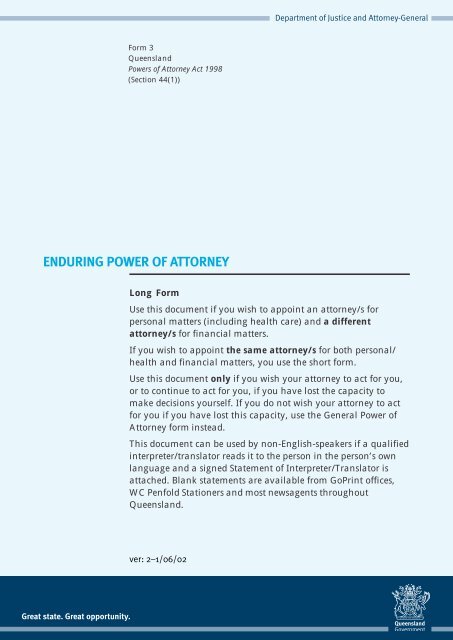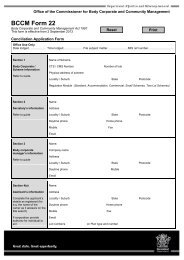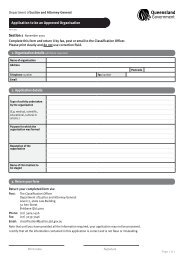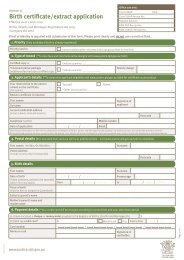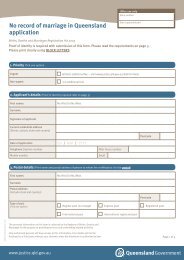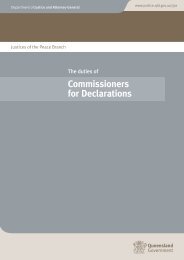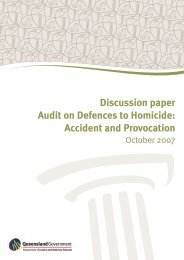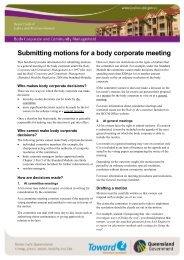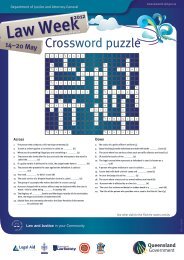Enduring Power of Attorney - Long Form - Department of Justice and ...
Enduring Power of Attorney - Long Form - Department of Justice and ...
Enduring Power of Attorney - Long Form - Department of Justice and ...
Create successful ePaper yourself
Turn your PDF publications into a flip-book with our unique Google optimized e-Paper software.
ENDURING POWER OF ATTORNEY<br />
ver: 2–1/06/02<br />
Great state. Great opportunity.<br />
<strong>Form</strong> 3<br />
Queensl<strong>and</strong><br />
<strong>Power</strong>s <strong>of</strong> <strong>Attorney</strong> Act 1998<br />
(Section 44(1))<br />
<strong>Long</strong> <strong>Form</strong><br />
Use this document if you wish to appoint an attorney/s for<br />
personal matters (including health care) <strong>and</strong> a different<br />
attorney/s for financial matters.<br />
If you wish to appoint the same attorney/s for both personal/<br />
health <strong>and</strong> financial matters, you use the short form.<br />
Use this document only if you wish your attorney to act for you,<br />
or to continue to act for you, if you have lost the capacity to<br />
make decisions yourself. If you do not wish your attorney to act<br />
for you if you have lost this capacity, use the General <strong>Power</strong> <strong>of</strong><br />
<strong>Attorney</strong> form instead.<br />
This document can be used by non-English-speakers if a qualified<br />
interpreter/translator reads it to the person in the person’s own<br />
language <strong>and</strong> a signed Statement <strong>of</strong> Interpreter/Translator is<br />
attached. Blank statements are available from GoPrint <strong>of</strong>fices,<br />
WC Penfold Stationers <strong>and</strong> most newsagents throughout<br />
Queensl<strong>and</strong>.<br />
ver: 2–1/06/02<br />
<strong>Department</strong> <strong>of</strong> <strong>Justice</strong> <strong>and</strong> <strong>Attorney</strong>-General<br />
1
PART 1 For the person appointing an attorney<br />
IMPORTANT NOTICE<br />
By completing this document, you can give a person <strong>of</strong> your choice the<br />
power to make decisions on your behalf about:<br />
personal/health matters<br />
<strong>and</strong>/or<br />
financial matters.<br />
What is enduring power <strong>of</strong> attorney?<br />
These pages explain, in question-<strong>and</strong>-answer form, what you need to know<br />
to complete the document properly.<br />
Because you are the person principally concerned, you are referred to as ‘the<br />
principal’.<br />
<strong>Power</strong> <strong>of</strong> attorney is the legal power to make decisions on someone<br />
else’s behalf. ‘<strong>Enduring</strong>’ simply means that the power continues even if<br />
the person giving it loses the capacity to make decisions.<br />
Why give someone enduring power <strong>of</strong> attorney?<br />
What types <strong>of</strong> decisions?<br />
There are some circumstances in which you may be unable to make<br />
decisions about matters that concern you. For example, you may be<br />
overseas, or you may be too ill.<br />
If you give someone general power <strong>of</strong> attorney, for instance to sign<br />
documents for you in your absence, that power will come to an<br />
immediate end if for some reason you lose your capacity to make<br />
decisions. This could be very awkward if your attorney is in the process<br />
<strong>of</strong> conducting business affairs for you.<br />
Giving someone enduring power means that he/she is able to continue<br />
to act for you if you lose capacity to act for yourself.<br />
You may give your attorney power to make decisions about:<br />
personal/health matters;<br />
financial matters.<br />
Examples <strong>of</strong> personal/health matters are decisions about where <strong>and</strong><br />
with whom you live, whether you work or undertake education or<br />
training, whether you apply for a licence or permit, <strong>and</strong> day-to-day<br />
issues like diet <strong>and</strong> dress, <strong>and</strong> whether to consent, refuse to consent or<br />
withdraw consent to particular types <strong>of</strong> health care for you (such as an<br />
operation).<br />
An example <strong>of</strong> a financial matter is deciding how your income should<br />
be invested.<br />
3
4<br />
Note: You cannot give your attorney power to make decisions about:<br />
special personal matters, such as a decision about your will, appointing<br />
someone as your attorney, voting at elections, or consenting to adoption or<br />
marriage;<br />
special health matters, such as donation <strong>of</strong> body tissue, sterilisation, pregnancy<br />
termination, research or experimental health care, or certain psychiatric or<br />
other health care as specified in the regulations.<br />
Your attorney can consent to the withdrawing or withholding <strong>of</strong> life-sustaining medical<br />
treatment if, for instance, you become terminally ill or go into a state <strong>of</strong> permanent or<br />
persistent unconsciousness. You can also give instructions about this type <strong>of</strong> decision if<br />
you make an Advance Health Directive.<br />
These instructions will override any decision <strong>of</strong> your attorney.<br />
Can I limit my attorney’s powers?<br />
Yes, you can specify decisions that you do not want your attorney to<br />
make. You can also include particular instructions about what you<br />
would like your attorney to do. Your attorney must always act in<br />
accordance with your instructions.<br />
There are also limits set by legislation. For example, the Trusts Act<br />
names the types <strong>of</strong> investment that a trustee (in this case your<br />
attorney) is authorised to make. If you lose the capacity to make<br />
financial decisions, the only investments your attorney can make on<br />
your behalf are those that are named in the Act, unless the consent<br />
<strong>of</strong> the Court is obtained.<br />
Can I appoint more than one attorney?<br />
Yes. Several options are provided for in the Act. For example, you<br />
may appoint two or more attorneys to act jointly (together), or as a<br />
majority (simple, two-thirds, etc.) or severally (any one <strong>of</strong> your<br />
attorneys can sign), or successively (power is given to a particular<br />
attorney when the power given to another attorney ends, or when<br />
the other attorney is not available to make decisions).<br />
If you choose two or more attorneys to make decisions jointly, they<br />
have equal authority <strong>and</strong> can act only with the agreement <strong>of</strong> them<br />
all. If one attorney dies, the remaining attorneys exercise the power.<br />
It is important that your intentions be expressed clearly. There is<br />
space in this document to appoint up to three attorneys.<br />
Whom should I appoint as my attorney?<br />
You should appoint someone you trust. Many people choose their<br />
spouse or an adult child, but you may prefer to appoint another<br />
family member or friend with expertise in the area, or the Adult<br />
Guardian for personal matters, or the Public Trustee or a trustee<br />
company for all matters. (The Adult Guardian is appointed by statute<br />
to look after the rights <strong>and</strong> interests <strong>of</strong> people with disabilities <strong>and</strong>,<br />
in certain situations, to give health-care consent.)
Your attorney must be over eighteen years <strong>of</strong> age, must not be your<br />
current paid carer or your current health-care provider (such as your<br />
nurse or your doctor), <strong>and</strong> (for financial matters) must not be<br />
bankrupt or insolvent.<br />
Note: ‘Paid carer’ does not mean someone receiving a carer’s pension or similar benefit, so<br />
you are free to choose someone who is receiving such a benefit for looking after you.<br />
Should I pay my attorney?<br />
You do not need to pay your attorney for the power to be effective.<br />
Normally payment is not made unless a trust company is acting as<br />
attorney.<br />
When does the attorney’s power begin?<br />
With personal/health matters, your attorney’s power to make decisions<br />
does not begin until (if ever) you are incapable <strong>of</strong> underst<strong>and</strong>ing the<br />
nature <strong>and</strong> foreseeing the effects <strong>of</strong> a decision, <strong>and</strong> <strong>of</strong> communicating<br />
that decision.<br />
With financial matters, you may nominate when your attorney’s<br />
power is to begin. If you do not name a date or an occasion, it begins<br />
immediately. On the other h<strong>and</strong>, if you lose the capacity to make such<br />
decisions before the date or occasion you name, the power begins at<br />
that point.<br />
Note: Even if you give your attorney power immediately, you may also continue to make<br />
decisions yourself while you are able to do so.<br />
How much control will my attorney have?<br />
Once the power to make a decision begins, your attorney will have full<br />
control over that decision unless you have explicitly limited that power<br />
in this document.<br />
Note: It is better not to place too many restrictions on your attorney’s power, as this may<br />
make it difficult for your attorney to make decisions on your behalf.<br />
How long does the power continue?<br />
For personal/health matters, it continues so long as you are incapable<br />
<strong>of</strong> underst<strong>and</strong>ing the nature <strong>and</strong> foreseeing the effects <strong>of</strong> a decision,<br />
<strong>and</strong> <strong>of</strong> communicating that decision.<br />
For financial matters, it continues until it is revoked.<br />
How can I be sure that my attorney will act in my interests?<br />
While (if ever) you are unable to oversee your attorney’s decisions, the<br />
Adult Guardian <strong>and</strong> the Court have the power to protect your<br />
interests. Your attorney may be required to produce a summary <strong>of</strong><br />
receipts <strong>and</strong> expenditure or more detailed accounts, <strong>and</strong> these may be<br />
audited. An attorney who does not adequately protect your interests<br />
can be removed or changed.<br />
5
6<br />
Can I change or revoke this power <strong>of</strong> attorney?<br />
Yes, you may change or revoke it at any time, so long as you are<br />
capable <strong>of</strong> underst<strong>and</strong>ing what you are doing. In other words, so<br />
long as you have the capacity to make an enduring power <strong>of</strong><br />
attorney, you also have the capacity to change or revoke it.<br />
If you do change or revoke this power, you must inform your<br />
attorney.<br />
Is there anything else that will end this power?<br />
How do I complete this document?<br />
Yes, several other circumstances will bring this enduring power <strong>of</strong><br />
attorney to an end:<br />
If you get married. If you marry, the power <strong>of</strong> attorney is<br />
revoked unless your new spouse is already your attorney. (If<br />
your new spouse is your attorney, the only power that is<br />
revoked is the power <strong>of</strong> any other attorney you may have.)<br />
If you get divorced. If you divorce, the power <strong>of</strong> attorney is<br />
revoked to the extent that it was given to your former spouse.<br />
If you die. If you die, the enduring power <strong>of</strong> attorney is revoked<br />
in its entirety.<br />
If you make an inconsistent document. This power is revoked<br />
to the extent <strong>of</strong> any inconsistency with any later document you<br />
complete, such as an Advance Health Directive or another<br />
enduring power <strong>of</strong> attorney.<br />
If your attorney withdraws. Your attorney may withdraw by<br />
giving you a signed notice or by getting the Court’s leave to<br />
withdraw.<br />
If your attorney becomes your paid carer or health-care<br />
provider. If this happens, your attorney’s power is revoked.<br />
If your attorney becomes incapable. Your attorney’s power is<br />
revoked if he/she becomes incapable <strong>of</strong> underst<strong>and</strong>ing the<br />
nature <strong>and</strong> foreseeing the effects <strong>of</strong> a decision, <strong>and</strong> <strong>of</strong><br />
communicating that decision.<br />
If your attorney becomes bankrupt or insolvent.<br />
If your attorney dies.<br />
The document is organised so that you can give enduring power <strong>of</strong><br />
attorney for personal matters, or for financial matters, or for both. It<br />
includes three forms:<br />
<strong>Form</strong> 1, which you complete if you wish to give power to an<br />
attorney for personal/health matters;<br />
<strong>Form</strong> 2, which you complete if you wish to give an attorney<br />
power for financial matters;<br />
<strong>Form</strong> 3, which your attorney completes.<br />
To appoint an attorney or attorneys for both personal <strong>and</strong> financial<br />
matters, all three forms must be completed.
Who is involved in completing this document?<br />
At least three people:<br />
You (the principal). You complete either <strong>Form</strong> 1: Appointing an<br />
<strong>Attorney</strong> for Personal Matters or <strong>Form</strong> 2: Appointing an <strong>Attorney</strong> for<br />
Financial Matters (or both <strong>Form</strong> 1 <strong>and</strong> <strong>Form</strong> 2). You must sign<br />
after clause 6 in <strong>Form</strong> 1 <strong>and</strong>/or clause 14 in <strong>Form</strong> 2.<br />
If you have a physical disability which prevents you from<br />
signing, you may instruct another person to sign for you, but you<br />
must give the instruction in front <strong>of</strong> the witness, <strong>and</strong> the signing<br />
must be done in your presence. This person must be eighteen<br />
years old or more, <strong>and</strong> must not be the witness or your attorney.<br />
He/she must complete the statement beside the place for his/her<br />
signature.<br />
The witness, who must be a justice <strong>of</strong> the peace, commissioner<br />
for declarations, lawyer or notary public. The witness must not<br />
also sign for you <strong>and</strong> must not be your attorney, a relation <strong>of</strong><br />
yours or <strong>of</strong> the person/s you appoint as attorney. If the power<br />
includes dealing with personal/health matters, the witness must<br />
not be your current paid carer or your current health-care<br />
provider.<br />
The witness must state that you appeared to underst<strong>and</strong> what<br />
you were doing. If teh witness is not sure that you underst<strong>and</strong> the<br />
nature <strong>and</strong> effect <strong>of</strong> the appointment, he/she should refuse to<br />
sign the document.<br />
If you are appointing an attorney for personal matters, the<br />
witness must sign <strong>Form</strong> 1 after Clause 6 <strong>and</strong> must also complete<br />
the Certificate <strong>of</strong> witness to <strong>Form</strong> 1, which follows.<br />
If you are appointing an attorney for financial matters, the<br />
witness must sign <strong>Form</strong> 2 after Clause 14 <strong>and</strong> must also complete<br />
the Certificate <strong>of</strong> witness to <strong>Form</strong> 2, which follows.<br />
The attorney. Your attorney/s must be at least eighteen years old<br />
<strong>and</strong> must not be your current paid carer or health-care provider.<br />
If you are appointing an attorney/s for personal/health matters,<br />
the attorney must complete <strong>Form</strong> 3: <strong>Attorney</strong>’s acceptance,<br />
(a) Acceptance by attorney for personal/health matters.<br />
If you are appointing an attorney for financial matters, the<br />
attorney must complete <strong>Form</strong> 3: <strong>Attorney</strong>’s acceptance,<br />
(b) Acceptance by attorney for financial matters.<br />
If you are appointing attorneys for both personal/health <strong>and</strong><br />
financial matters your attorneys must complete both sections (a)<br />
<strong>and</strong> (b) <strong>of</strong> <strong>Form</strong> 3: <strong>Attorney</strong>’s acceptance.<br />
7
8<br />
Where can I go for advice?<br />
The Adult Guardian, the Public Trustee or a solicitor can advise you<br />
about the enduring power <strong>of</strong> attorney <strong>and</strong> how to complete this<br />
document.<br />
If you are completing an enduring power <strong>of</strong> attorney for personal/<br />
health matters, it is strongly recommended that you notify your<br />
doctor.<br />
What happens to this document when it is completed?<br />
How do I register the document?<br />
You should leave the original in a safe place, such as with your bank,<br />
but it’s important to keep a copy to refer to.<br />
You should also give a copy to anyone else who may need to be<br />
involved, such as:<br />
your attorney;<br />
your doctor;<br />
your solicitor;<br />
your accountant;<br />
your stockbroker.<br />
You may also wish to carry a card in your purse or wallet, stating that<br />
you have made an enduring power <strong>of</strong> attorney, <strong>and</strong> giving details <strong>of</strong><br />
that appointment.<br />
If your attorney will be making decisions about buying or selling l<strong>and</strong>,<br />
this document must be registered with the L<strong>and</strong> Titles Office.<br />
It is not necessary to do so unless it is likely to be used in transactions<br />
related to buying or selling l<strong>and</strong>. If you register the document, you<br />
must take the original copies to the L<strong>and</strong> Titles Office <strong>and</strong> pay the<br />
fee.<br />
If the power is revoked, you must deregister the document by<br />
lodging a revocation form with the L<strong>and</strong> Titles Office.
FORM 1: APPOINTING AN ATTORNEY FOR PERSONAL/HEALTH MATTERS<br />
As principal, you complete this form by writing on the lines <strong>and</strong><br />
ticking the appropriate boxes.<br />
Note: If you do not want your attorney to make decisions about personal/health matters, rule<br />
a line through <strong>Form</strong> 1 (pages 9, 10 <strong>and</strong> 11) <strong>and</strong> Certificate <strong>of</strong> witness to <strong>Form</strong> 1 (page<br />
12).<br />
1. I, ________________________________________________________________ (‘the principal’),<br />
[Print your full name here]<br />
<strong>of</strong> _____________________________________________________________________________ ,<br />
[Print your address here]<br />
________________________________________________________________________________<br />
appoint _________________________________________________________________________<br />
[Print the full name <strong>of</strong> your first attorney for personal/health matters here]<br />
<strong>of</strong> _____________________________________________________________________________ ,<br />
[Print your first attorney’s address here]<br />
______________________________________________________ Ph: _____________________<br />
<strong>and</strong> ________________________________________________________________________________ ,<br />
[Print the full name <strong>of</strong> your second attorney for personal matters here if you wish to appoint more than one,<br />
OR rule a line through this <strong>and</strong> the next 5 lines if you wish to appoint only one]<br />
<strong>of</strong> _____________________________________________________________________________ ,<br />
[Print your second attorney’s address here]<br />
______________________________________________________ Ph: _____________________<br />
<strong>and</strong> _______________________________________________________________________________ ,<br />
[Print the full name <strong>of</strong> your third attorney for personal matters here if you wish to appoint more than two,<br />
OR rule a line through this <strong>and</strong> the next 2 lines if you wish to appoint only two]<br />
<strong>of</strong> _____________________________________________________________________________ ,<br />
[Print your second attorney’s address here]<br />
______________________________________________________ Ph: _____________________<br />
as my attorney/s, under enduring power <strong>of</strong> attorney, for personal/health matters.<br />
2. Do you want to set any terms for the power given in Clause 1 (e.g. limit the power<br />
<strong>of</strong> your attorney or give specific information about your wishes)?<br />
No Go to 4.<br />
Yes.<br />
9
10<br />
3. Write these terms here: (For example: ‘My attorney/s must not consent to a blood<br />
transfusion on my behalf’ or ‘If I need nursing-home care, I want my attorney to try XYZ<br />
Nursing Home first.’ )<br />
________________________________________________________________________________<br />
________________________________________________________________________________<br />
________________________________________________________________________________<br />
________________________________________________________________________________<br />
________________________________________________________________________________<br />
________________________________________________________________________________<br />
4. Are you appointing more than one attorney for personal/health matters?<br />
No Go to 6.<br />
Yes.<br />
5. How do you prefer that they make their decisions? (Tick one box only)<br />
Severally (any one <strong>of</strong> them may decide)<br />
Jointly (unanimously)<br />
As a majority (if you are appointing more then three attorneys, please specify,<br />
e.g. ‘Simple majority’, ‘Two-thirds majority’)<br />
________________________________________________________________________________<br />
Other*<br />
________________________________________________________________________________<br />
*Note: The <strong>Power</strong>s <strong>of</strong> <strong>Attorney</strong> Act 1998 allows you to appoint successive attorney/s for a matter so that the power is<br />
given to a particular attorney only when power to a previous attorney ends. You can nominate the circumstances<br />
that a power will end (e.g. if x leaves the jurisdiction y may act).
6. STATEMENT OF UNDERSTANDING<br />
(1) I fully underst<strong>and</strong> that, by signing <strong>Form</strong> 1 <strong>of</strong> this document, I give power to the<br />
attorney/s mentioned in Clause 1 to make decisions on my behalf about<br />
personal/health matters.<br />
(2) I underst<strong>and</strong> that I may specify or limit the attorney/s power, <strong>and</strong> instruct the<br />
attorney/s about the exercise <strong>of</strong> the power.<br />
(3) I underst<strong>and</strong> that this gives the attorney/s power to do, for me, anything I could<br />
lawfully do myself in relation to these matters (except for special personal/health<br />
matters), subject to any terms mentioned in this form.<br />
(4) I underst<strong>and</strong> that, because <strong>of</strong> the Act, the power given to my attorney/s in Clause<br />
1 begins only when (if ever) I become incapable <strong>of</strong> underst<strong>and</strong>ing the nature <strong>and</strong><br />
foreseeing the effects <strong>of</strong> such decisions, or <strong>of</strong> communicating those decisions.<br />
(5) I underst<strong>and</strong> that I may change or revoke this enduring power <strong>of</strong> attorney at any<br />
time so long as my power to make such a decision is not impaired—in other<br />
words, so long as I am capable <strong>of</strong> making another enduring power <strong>of</strong> attorney.<br />
___________________________________<br />
[Principal signs here]<br />
or<br />
If you are signing for principal:<br />
(a) I am at least eighteen years old<br />
(b) I am not a witness for this enduring<br />
power <strong>of</strong> attorney or an attorney for<br />
the principal.<br />
___________________________________<br />
[Person signing for the principal signs here]<br />
________________________<br />
[Write the date here]<br />
____________________________________<br />
[Witness signs here]<br />
____________________________________<br />
[Witness writes the date here]<br />
11
12<br />
CERTIFICATE OF WITNESS TO FORM 1<br />
Your role goes beyond ensuring that the signature <strong>of</strong> the principal (the<br />
person giving the power) is genuine. You certify that the principal appeared<br />
to underst<strong>and</strong> the matters stated in clause 6 (Statement <strong>of</strong> underst<strong>and</strong>ing).<br />
In the future, you may have to provide information about the principal’s<br />
capacity to underst<strong>and</strong> these matters when giving the power. If you are<br />
doubtful about the principal’s capacity, you should make appropriate<br />
inquiries, e.g. from the principal’s doctor.<br />
It is strongly recommended that, if you are in any doubt, you make a<br />
written record <strong>of</strong> the proceedings <strong>and</strong> <strong>of</strong> any questions you asked to<br />
determine the principal’s capacity.<br />
Complete this form by writing on the lines <strong>and</strong> ticking the appropriate boxes.<br />
7. I, ______________________________________________________________________________ ,<br />
state that—<br />
(a) I am a:<br />
justice <strong>of</strong> the peace<br />
commissioner for declarations<br />
lawyer<br />
notary public,<br />
[Print your full name here]<br />
(b) I am not:<br />
an attorney for the principal<br />
or a relation <strong>of</strong> the principal or <strong>of</strong> the principal’s attorney/s<br />
or a current paid carer or current health-care provider for the principal<br />
Note: ‘Paid carer’ does not mean someone receiving a carer’s pension or similar benefit.<br />
<strong>and</strong><br />
(c) (Tick one box only)<br />
the principal signed this enduring power <strong>of</strong> attorney in my presence<br />
in my presence, the principal instructed a person to sign this enduring power <strong>of</strong><br />
attorney for the principal, <strong>and</strong> that person signed it in my presence <strong>and</strong> in the<br />
presence <strong>of</strong> the principal<br />
(d) at the time that this enduring power <strong>of</strong> attorney was signed, the principal<br />
appeared to me to underst<strong>and</strong> the matters stated in Clause 6.<br />
_________________________________________________<br />
[Witness signs here]<br />
_________________________________________________<br />
[Witness writes the date here]
FORM 2: APPOINTING AN ATTORNEY FOR FINANCIAL MATTERS<br />
As principal, you complete this form by writing on the lines <strong>and</strong> ticking the<br />
appropriate boxes.<br />
Note: If you do not want your attorney to make decisions about financial matters, rule a line<br />
through <strong>Form</strong> 2 (pages 13 <strong>and</strong> 14), <strong>and</strong> Certificate <strong>of</strong> witness for <strong>Form</strong> 2 (page 16).<br />
8. I, _______________________________________________________________ , (‘the principal’)<br />
[Print your full name here]<br />
<strong>of</strong> _____________________________________________________________________________ ,<br />
[Print your address here]<br />
________________________________________________________________________________<br />
appoint ________________________________________________________________________<br />
[Print the full name <strong>of</strong> your first attorney for financial matters here]<br />
<strong>of</strong> _____________________________________________________________________________ ,<br />
[Print your first attorney’s address here]<br />
______________________________________________________ Ph: _____________________<br />
<strong>and</strong> _______________________________________________________________________________ ,<br />
[Print the full name <strong>of</strong> your second attorney for financial matters here if you wish to appoint more than one,<br />
OR rule a line through this <strong>and</strong> the next 5 lines if you wish to appoint only one]<br />
<strong>of</strong> _____________________________________________________________________________ ,<br />
[Print your second attorney’s address here]<br />
______________________________________________________ Ph: _____________________<br />
<strong>and</strong> _______________________________________________________________________________ ,<br />
[Print the full name <strong>of</strong> your third attorney for financial matters here if you wish to appoint more than two,<br />
OR rule a line through this <strong>and</strong> the next 2 lines if you wish to appoint only two]<br />
<strong>of</strong> _____________________________________________________________________________ ,<br />
[Print your third attorney’s address here]<br />
______________________________________________________ Ph: _____________________<br />
as my attorney/s, under enduring power <strong>of</strong> attorney, for financial matters,<br />
9. Do you want to set any terms for the power given in clause 8 (e.g. limit the power<br />
<strong>of</strong> your attorney or give specific information about your wishes)?<br />
No Go to 11.<br />
Yes.<br />
10. Write these terms here: (For example: ‘My attorney is not authorised to invest in ABC Pty<br />
Ltd shares’ or ‘My attorney may sell my house at a fair market valuation in order to fund a<br />
home for me in a retirement village’)<br />
________________________________________________________________________________<br />
________________________________________________________________________________<br />
________________________________________________________________________________<br />
________________________________________________________________________________<br />
*Note: These terms may limit your attorney in making decisions for your benefit.<br />
13
14<br />
11. When do you want the power <strong>of</strong> your attorney/s for financial matters to begin?<br />
(Tick one box only)<br />
Immediately.<br />
On this date: _______________________________________________________________<br />
[Write here the date when you want the power <strong>of</strong> your attorney/s to begin]<br />
On this occasion: ___________________________________________________________<br />
[Write here the occasion when you want the power <strong>of</strong> your attorney/s to begin]<br />
(If you fail to complete this clause, the power will begin immediately.)<br />
12. Are you appointing more than one attorney?<br />
No Go to 14.<br />
Yes.<br />
13. How do you prefer that they make their decisions? (Tick one box only)<br />
Severally (any one <strong>of</strong> them may decide)<br />
Jointly (unanimously)<br />
As a majority (if you are appointing more than three attorneys, please specify,<br />
e.g. ‘Simple majority’, ‘Two-thirds majority’)<br />
________________________________________________________________________________<br />
Other*<br />
________________________________________________________________________________<br />
*Note: The <strong>Power</strong>s <strong>of</strong> <strong>Attorney</strong> Act 1998 allows you to appoint successive attorney/s for a matter so that the power is<br />
given to a particular attorney only when power to a previous attorney ends. You can nominate the circumstances<br />
that a power will end (e.g. if x leaves the jurisdiction y may act).
14. STATEMENT OF UNDERSTANDING<br />
(1) I fully underst<strong>and</strong> that, by signing <strong>Form</strong> 2 <strong>of</strong> this document, I give power to the<br />
attorney/s mentioned in Clause 8 to make decisions on my behalf about financial<br />
matters.<br />
(2) I underst<strong>and</strong> that I may specify or limit the attorney/s power, <strong>and</strong> instruct the<br />
attorney/s about the exercise <strong>of</strong> the power.<br />
(3) I underst<strong>and</strong> that this gives the attorney/s power to do, for me, anything I could<br />
lawfully do myself in relation to these matters, subject to any terms mentioned in<br />
this form.<br />
(4) I underst<strong>and</strong> that, because <strong>of</strong> the Act, the power given to my attorney/s in Clause<br />
8 begins at the time stated in Clause 11 <strong>and</strong> continues even if I lose capacity.<br />
(5) I underst<strong>and</strong> that I may change or revoke this enduring power <strong>of</strong> attorney at any<br />
time so long as my power to make such a decision is not impaired—in other<br />
words, so long as I am capable <strong>of</strong> making another enduring power <strong>of</strong> attorney.<br />
___________________________________<br />
[Principal signs here]<br />
or<br />
If you are signing for principal:<br />
(a) I am at least eighteen years old<br />
(b) I am not a witness for this enduring<br />
power <strong>of</strong> attorney or an attorney for<br />
the principal.<br />
___________________________________<br />
[Person signing for the principal signs here]<br />
________________________<br />
[Write the date here]<br />
____________________________________<br />
[Witness signs here]<br />
____________________________________<br />
[Witness writes the date here]<br />
15
16<br />
CERTIFICATE OF WITNESS TO FORM 2<br />
Your role goes beyond ensuring that the signature <strong>of</strong> the principal (the<br />
person giving the power) is genuine. You certify that the principal appeared<br />
to underst<strong>and</strong> the matters stated in Clause 14 (Statement <strong>of</strong><br />
underst<strong>and</strong>ing). In the future, you may have to provide information about<br />
the principal’s capacity to underst<strong>and</strong> these matters when giving the power.<br />
If you are doubtful about the principal’s capacity, you should make<br />
appropriate inquiries, e.g. from the principal’s doctor.<br />
It is strongly recommended that, if you are in any doubt, you make a<br />
written record <strong>of</strong> the proceedings <strong>and</strong> <strong>of</strong> any questions you asked to<br />
determine the principal’s capacity.<br />
Complete this form by writing on the lines <strong>and</strong> ticking the appropriate boxes.<br />
15. I, ______________________________________________________________________________ ,<br />
<strong>and</strong><br />
state that—<br />
(a) I am a:<br />
justice <strong>of</strong> the peace<br />
commissioner for declarations<br />
lawyer<br />
notary public,<br />
[Print your full name here]<br />
(b) I am not:<br />
an attorney for the principal<br />
or a relation <strong>of</strong> the principal or <strong>of</strong> the principal’s attorney/s,<br />
(c) (Tick one box only)<br />
the principal signed this enduring power <strong>of</strong> attorney in my presence<br />
in my presence, the principal instructed a person to sign this enduring power <strong>of</strong><br />
attorney for the principal, <strong>and</strong> that person signed it in my presence <strong>and</strong> in the<br />
presence <strong>of</strong> the principal<br />
(d) at the time that this enduring power <strong>of</strong> attorney was signed, the principal<br />
appeared to me to underst<strong>and</strong> the matters stated in Clause 14.<br />
_________________________________________________<br />
[Witness signs here]<br />
_________________________________________________<br />
[Witness writes the date here]
IMPORTANT NOTICE TO THE ATTORNEY<br />
What are these responsibilities?<br />
If you accept this power <strong>of</strong> attorney, you will be taking on serious<br />
responsibilities. If you fail to observe these responsibilities, you could<br />
be removed as attorney or even convicted <strong>of</strong> an <strong>of</strong>fence <strong>and</strong> required<br />
to pay compensation.<br />
Besides the particular responsibilities mentioned in <strong>Form</strong> 1 <strong>and</strong>/or<br />
<strong>Form</strong> 2 <strong>of</strong> this document, there are responsibilities imposed by the<br />
<strong>Power</strong>s <strong>of</strong> <strong>Attorney</strong> Act 1998.<br />
They are both general <strong>and</strong> specific.<br />
General responsibilities (to guide you in decision-making)<br />
You must exercise the power given to you honestly <strong>and</strong> with<br />
reasonable care. It is an <strong>of</strong>fence not to do so, <strong>and</strong> you may also be<br />
required to compensate the principal.<br />
You must comply with the terms <strong>of</strong> the enduring power <strong>of</strong> attorney,<br />
any other Court requirement. In addition, you must abide by the<br />
general <strong>and</strong> health-care principles on which the Act is based.<br />
General principles include:<br />
presuming that the principal has the capacity to make a<br />
particular decision until there is conclusive evidence that this is<br />
not the case;<br />
recognising his/her right to participate in decisions affecting<br />
his/her life, to the maximum extent for which he/she has<br />
capacity;<br />
respecting the principal’s human worth <strong>and</strong> dignity <strong>and</strong> equal<br />
claim to basic human rights, regardless <strong>of</strong> his/her capacity;<br />
recognising the principal’s role as a valued member <strong>of</strong> society<br />
<strong>and</strong> encouraging his/her self-reliance <strong>and</strong> participation in<br />
community life;<br />
taking into account the importance <strong>of</strong> the principal’s existing<br />
supportive relationships, values <strong>and</strong> cultural <strong>and</strong> linguistic<br />
environment;<br />
ensuring that your decisions are appropriate to the principal’s<br />
characteristics <strong>and</strong> needs;<br />
recognising the principal’s right to confidentiality <strong>of</strong><br />
information.<br />
The health-care principles is:<br />
Any health-care decision you make for the principal must:<br />
maintain <strong>and</strong> promote the principal’s health or well-being or<br />
is in all the circumstances in the best interests <strong>of</strong> the adult;<br />
be made in the way that is least restrictive <strong>of</strong> the principal’s<br />
rights;<br />
17
18<br />
where possible, take account <strong>of</strong> the principal’s views <strong>and</strong><br />
wishes, along with information given by the principal’s<br />
health-care provider.<br />
Financial decisions<br />
Any investments you make on the principal’s behalf while he/she<br />
lacks the capacity to make financial decisions must be those that are<br />
named in the Trusts Act as investments that a trustee is authorised to<br />
make.<br />
Note: Reference to Court includes the Supreme Court or the<br />
Guardianship <strong>and</strong> Administration Tribunal.<br />
For all decisions<br />
If the principal has other attorneys, you must consult with them<br />
regularly <strong>and</strong> make your decisions as directed in Clauses 5 <strong>and</strong>/or<br />
13. If you are a joint attorney, for example, you <strong>and</strong> the other<br />
attorney/s must make your decisions unanimously.<br />
Specific responsibilities<br />
Duty to keep records. If you have the power to make financial<br />
decisions, you must keep reasonable records <strong>of</strong> dealings <strong>and</strong><br />
transactions made under the power. It is an <strong>of</strong>fence not to do<br />
so, <strong>and</strong> the Court or Adult Guardian may require you to<br />
produce them.<br />
Duty to keep property separate. You must keep your property<br />
separate from the principal’s property unless you <strong>and</strong> the<br />
principal own the property jointly.<br />
Duty to present a management plan <strong>and</strong> get approval for<br />
unauthorised transactions. If you make a financial decision,<br />
you must present a plan <strong>of</strong> management to the Court if the<br />
Court requires it.<br />
If the principal’s capacity to make decisions is impaired, you<br />
must also get approval from the Court for any transactions that<br />
have not been authorised in this document.<br />
Duty to avoid transactions that involve conflict <strong>of</strong> interest.<br />
You must not enter into transactions that could or do bring<br />
your interests (or those <strong>of</strong> your relation, business associate or<br />
close friend) into conflict with those <strong>of</strong> the principal. For<br />
example, you must not buy the principal’s car unless you pay at<br />
least its market value.<br />
However, you may enter into such a transaction if it has been<br />
authorised in this document or by the Court, or if the<br />
transaction provides for the needs <strong>of</strong> someone that the<br />
principal could reasonably be expected to provide for, such as<br />
his/her child.
Duty in relation to gifts. You must not give away the principal’s<br />
property except where the principal would be likely to do so,<br />
for example as a marriage gift to a relation <strong>of</strong> the principal or<br />
a donation <strong>of</strong> to his/her favourite charity (so long as the size <strong>of</strong><br />
the gift is reasonable in the circumstances).<br />
<strong>Power</strong> to maintain the principal’s dependants. You may give<br />
reasonable maintenance to the principal’s dependants.<br />
How do I complete a document for the principal?<br />
If you have the power to execute (complete) a document for the<br />
principal, you do so in the ordinary way, but you must note on the<br />
document that you are executing it as the principal’s attorney under<br />
enduring power <strong>of</strong> attorney (e.g. ‘John Smith, by his duly appointed<br />
attorney, Mary Jones’).<br />
When does my power to make decisions begin?<br />
When does my power end?<br />
It depends whether the power concerns personal/health matters or<br />
financial matters.<br />
Personal/health matters. Your power to make decisions for the<br />
principal about personal/health matters does not begin until<br />
(if ever) the principal is incapable <strong>of</strong> underst<strong>and</strong>ing the nature<br />
<strong>and</strong> foreseeing the effects <strong>of</strong> the decision, <strong>and</strong> <strong>of</strong><br />
communicating that decision. However, you must continue to<br />
allow, <strong>and</strong> assist, the principal to make decisions in so far as<br />
he/she is capable.<br />
Financial matters. The principal may nominate in this<br />
document when your power to make financial decisions<br />
begins. If the principal does not nominate a date or occasion,<br />
then your power begins immediately.<br />
Though there is no time limit on enduring power <strong>of</strong> attorney,<br />
certain actions by you, the principal or the Court can bring your<br />
power to an end.<br />
In personal/health matters, your power also ends if the principal<br />
regains the ability to make the decision in question.<br />
Your actions<br />
Your withdrawal. So long as the principal is capable <strong>of</strong> using<br />
the power given to you, you can withdraw by giving him/her a<br />
signed notice or by getting the Court’s leave to withdraw.<br />
Becoming the principal’s paid carer or health-care provider.<br />
If this happens, your power is revoked.<br />
Note: ‘Paid carer’ does not mean someone receiving a carer’s pension or similar benefit.<br />
19
20<br />
Becoming incapable. Your power is revoked if you become<br />
incapable <strong>of</strong> underst<strong>and</strong>ing the nature <strong>and</strong> foreseeing the<br />
effects <strong>of</strong> a decision, <strong>and</strong> <strong>of</strong> communicating that decision.<br />
Becoming bankrupt or insolvent. If this happens, your power<br />
is revoked.<br />
Your death.<br />
The principal’s actions<br />
Revoking your power. The principal may revoke your power<br />
at any time, so long as his/her capacity to make the decision is<br />
unimpaired. In other words, so long as the principal has the<br />
capacity to make an enduring power <strong>of</strong> attorney, he/she also<br />
has the capacity to revoke it.<br />
If the principal revokes your power, he/she must inform you in<br />
writing.<br />
Appointing a new attorney to have your powers. If the<br />
principal completes a new document giving your powers to<br />
another attorney, your powers are revoked to that extent.<br />
Because the new document has a later date, it overrides the<br />
first.<br />
Getting married. If the principal marries, your power <strong>of</strong><br />
attorney is revoked unless you are the principal’s new spouse.<br />
(If you are the principal’s new spouse, the only power that is<br />
revoked is the power <strong>of</strong> any other attorney that the principal<br />
may have.)<br />
Getting divorced. If the principal divorces <strong>and</strong> you were the<br />
principal’s former spouse, your power <strong>of</strong> attorney is revoked.<br />
The principal’s death. If the principal dies, your enduring<br />
power <strong>of</strong> attorney is revoked in its entirety.<br />
Actions by the Court<br />
Your power may also be changed or revoked by the Court if you<br />
have failed to act in the principal’s interests.<br />
Can I be held liable?<br />
Yes, if you use the enduring power <strong>of</strong> attorney knowing that it has<br />
been changed or revoked, or knowing <strong>of</strong> an event that effectively<br />
revokes it, or even if you have reason to believe that it has been<br />
revoked.<br />
The Court <strong>and</strong> the Adult Guardian have the power to protect the<br />
principal’s interests. You may be required to produce a summary <strong>of</strong><br />
receipts <strong>and</strong> expenditure or more detailed accounts, <strong>and</strong> these may<br />
be audited. You may also be required to give evidence in relation to<br />
the exercise <strong>of</strong> your powers. If the Court or Adult Guardian believes<br />
that you have not adequately protected the principal’s interests, you<br />
may be removed or your enduring power <strong>of</strong> attorney may be<br />
revoked <strong>and</strong> you may be required to compensate the principal.
Where can I go for advice?<br />
The Court, the Adult Guardian, the Public Trustee, or a solicitor can<br />
advise you about this document <strong>and</strong> your power <strong>and</strong> responsibilities<br />
under it.<br />
The Court can also make a declaration about the validity <strong>of</strong> this<br />
document or whether your power to make a decision for the principal<br />
has begun.<br />
21
22<br />
FORM 3: ATTORNEY’S ACCEPTANCE<br />
As attorney, you complete the section <strong>of</strong> this form that applies to you by<br />
ticking the boxes <strong>and</strong> writing on the lines. If you are not able to tick all the<br />
boxes truthfully, then you must not accept this appointment as attorney.<br />
(a) Acceptance by attorney/s for personal/health matters<br />
(First or only attorney completes this section)<br />
16. I, ____________________________________________________________________ , state that:<br />
[Print your full name here]<br />
I am eighteen or over,<br />
I am not a current paid carer <strong>of</strong> the principal,<br />
I am not a current health-care provider for the principal,<br />
I have read <strong>Form</strong> 1 <strong>of</strong> this document, giving me enduring power <strong>of</strong> attorney for<br />
personal/health matters,<br />
I underst<strong>and</strong> that, by signing this document, I take on the responsibility <strong>of</strong><br />
exercising the power I have been given in the document,<br />
I also underst<strong>and</strong> that I must exercise the power in accordance with the <strong>Power</strong>s <strong>of</strong><br />
<strong>Attorney</strong> Act 1998 <strong>and</strong> the Guardianship <strong>and</strong> Administration Act 2000.<br />
_________________________________________________<br />
[Write your signature here]<br />
_________________________________________________<br />
[Write the date here]<br />
(Second attorney, if any, completes this section)<br />
17. I, ____________________________________________________________________ , state that:<br />
[Print your full name here]<br />
I am eighteen or over,<br />
I am not a current paid carer <strong>of</strong> the principal,<br />
I am not a current health-care provider for the principal,<br />
I have read <strong>Form</strong> 1 <strong>of</strong> this document, giving me enduring power <strong>of</strong> attorney for<br />
personal/health matters,<br />
I underst<strong>and</strong> that, by signing this document, I take on the responsibility <strong>of</strong><br />
exercising the power I have been given in the document,<br />
I also underst<strong>and</strong> that I must exercise the power in accordance with the <strong>Power</strong>s <strong>of</strong><br />
<strong>Attorney</strong> Act 1998 <strong>and</strong> the Guardianship <strong>and</strong> Administration Act 2000.<br />
_________________________________________________<br />
[Write your signature here]<br />
_________________________________________________<br />
[Write the date here]
(Third attorney, if any, completes this section)<br />
18. I, ____________________________________________________________________ , state that:<br />
[Print your full name here]<br />
I am eighteen or over,<br />
I am not a current paid carer <strong>of</strong> the principal,<br />
I am not a current health-care provider for the principal,<br />
I have read <strong>Form</strong> 1 <strong>of</strong> this document, giving me enduring power <strong>of</strong> attorney for<br />
personal/health matters,<br />
I underst<strong>and</strong> that, by signing this document, I take on the responsibility <strong>of</strong><br />
exercising the power I have been given in the document,<br />
I also underst<strong>and</strong> that I must exercise the power in accordance with the <strong>Power</strong>s <strong>of</strong><br />
<strong>Attorney</strong> Act 1998 <strong>and</strong> the Guardianship <strong>and</strong> Administration Act 2000.<br />
_________________________________________________<br />
[Write your signature here]<br />
_________________________________________________<br />
[Write the date here]<br />
(b) Acceptance by attorney/s for financial matters<br />
(First or only attorney completes this section)<br />
19. I, ____________________________________________________________________ , state that:<br />
[Print your full name here]<br />
I am eighteen or over,<br />
I am not a current paid carer <strong>of</strong> the principal,<br />
I am not a current health-care provider for the principal,<br />
I have read <strong>Form</strong> 2 <strong>of</strong> this document, giving me enduring power <strong>of</strong> attorney for<br />
financial matters,<br />
I underst<strong>and</strong> that, by signing this document, I take on the responsibility <strong>of</strong><br />
exercising the power I have been given in the document,<br />
I also underst<strong>and</strong> that I must exercise the power in accordance with the <strong>Power</strong>s <strong>of</strong><br />
<strong>Attorney</strong> Act 1998 <strong>and</strong> the Guardianship <strong>and</strong> Administration Act 2000.<br />
_________________________________________________<br />
[Write your signature here]<br />
_________________________________________________<br />
[Write the date here]<br />
23
24<br />
(Second attorney, if any, completes this section)<br />
20. I, ____________________________________________________________________ , state that:<br />
[Print your full name here]<br />
I am eighteen or over,<br />
I am not a current paid carer <strong>of</strong> the principal,<br />
I am not a current health-care provider for the principal,<br />
I have read <strong>Form</strong> 2 <strong>of</strong> this document, giving me enduring power <strong>of</strong> attorney for<br />
financial matters,<br />
I underst<strong>and</strong> that, by signing this document, I take on the responsibility <strong>of</strong><br />
exercising the power I have been given in the document,<br />
I also underst<strong>and</strong> that I must exercise the power in accordance with the <strong>Power</strong>s <strong>of</strong><br />
<strong>Attorney</strong> Act 1998 <strong>and</strong> the Guardianship <strong>and</strong> Administration Act 2000.<br />
_________________________________________________<br />
[Write your signature here]<br />
_________________________________________________<br />
[Write the date here]<br />
(Third attorney, if any completes this section)<br />
21. I, ____________________________________________________________________ , state that:<br />
[Print your full name here]<br />
I am eighteen or over,<br />
I am not a current paid carer <strong>of</strong> the principal,<br />
I am not a current health-care provider for the principal,<br />
I have read <strong>Form</strong> 2 <strong>of</strong> this document, giving me enduring power <strong>of</strong> attorney for<br />
financial matters,<br />
I underst<strong>and</strong> that, by signing this document, I take on the responsibility <strong>of</strong><br />
exercising the power I have been given in the document,<br />
I also underst<strong>and</strong> that I must exercise the power in accordance with the <strong>Power</strong>s <strong>of</strong><br />
<strong>Attorney</strong> Act 1998 <strong>and</strong> the Guardianship <strong>and</strong> Administration Act 2000.<br />
_________________________________________________<br />
[Write your signature here]<br />
_________________________________________________<br />
[Write the date here]<br />
CLEAR FORM<br />
June 2002<br />
CLEAR PAGE 24


